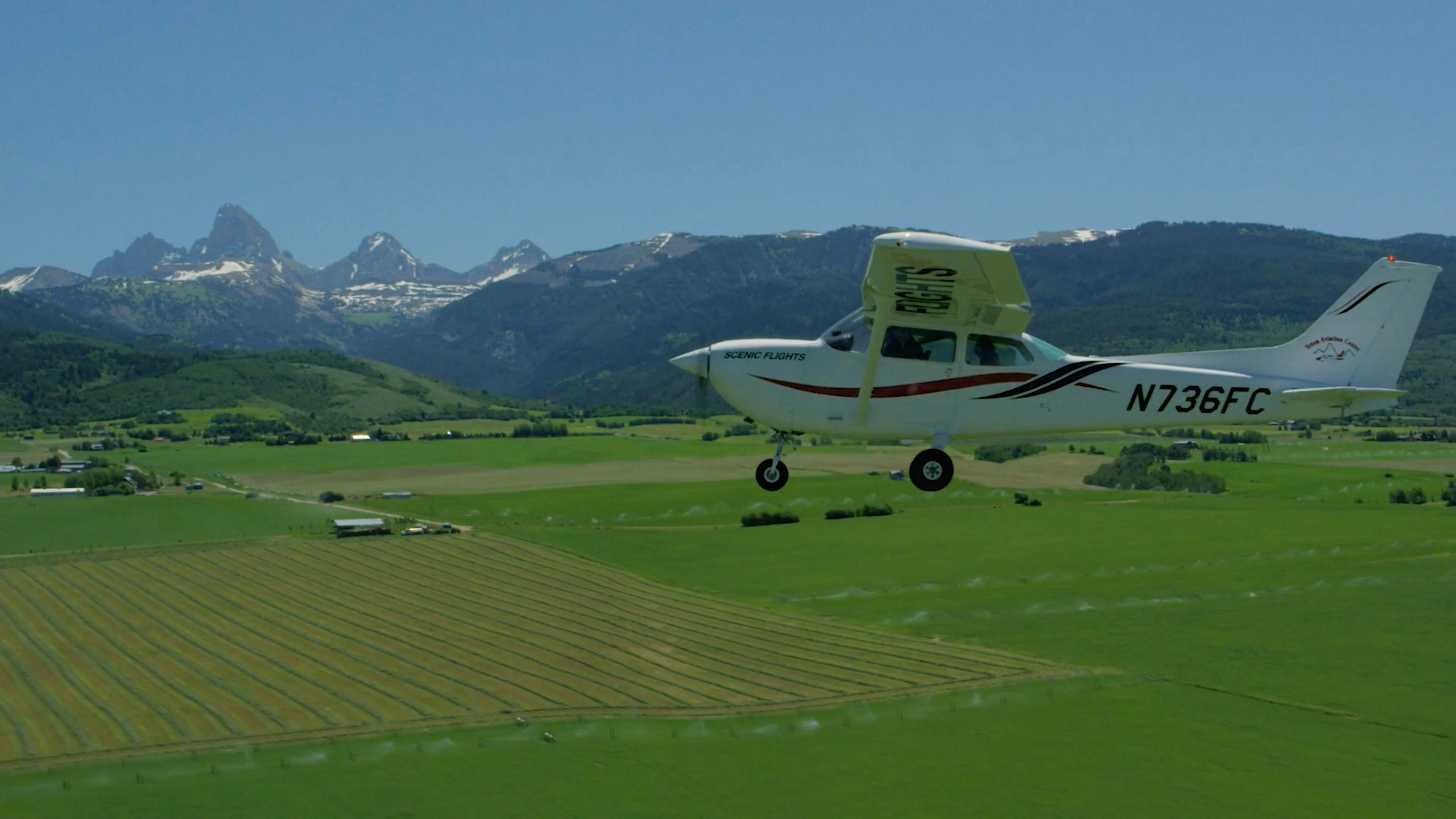
Contact Information
Driggs-Reed Airport
253 Warbird Lane
Driggs, Idaho 83422
Teton Aviation (FBO)
Phone: (208) 354-3100
Airport Operations
Billy Cyr
Phone: (208) 354-2362
Email: bcyr@driggsidaho.org
Hours: Monday-Thursday 8:00 a.m. - 5:00 p.m.
Closed Fridays and Federal Holidays
KDIJ Noise Abatement
Support the Airport's Good Neighbor Policy
Pilots: Thank you for working with us by adhering to the following procedures:
Voluntary Noise Abatement Procedures
- AVOID flight operations between 2200 and 0700 local.
- Please observe this curfew unless an emergency exists.
- Aircraft with a Gross Takeoff Operating Weight in excess of 12,500 pounds should not be operated before 7:00 AM.
- Right Traffic Pattern Runway 22
- Traffic Pattern Altitude: 1000 AGL
- Use best angle (Vx) for first 500 feet . . . then best rate (Vy) to achieve maximum altitude.
- Intersection departures are discouraged.
- Avoid shallow climbs and gain as much altitude as safely possible before leaving the airport environment.
- Avoid flight over residential areas. Arrivals and departures over highways are preferred.
- Pattern altitude: 7,231 light aircraft. 7,731 heavy aircraft.
Curfew: There is a voluntary curfew on arrivals and departures between 10:00 p.m. and 7:00 a.m. As part of our "Good Neighbor" policy, we ask that you respect this curfew. We limit hours of service and fuel to discourage night operations. The City of Driggs has adopted voluntary noise abatement procedures for the Driggs-Reed Memorial Airport. Pilots arriving and departing from the airport are requested to use every means at their disposal to reduce the impact of noise on the Teton Valley Community.
DOWNLOAD NOISE ABATEMENT PROCEDURES PDF
KDIJ Rules and Regulations
FAA Noise Complaint Information for Community Airports
VFR / Visual Flight Rules: ARRIVALS
Southwest over Pine Creek Pass, remain west of Highway 33, overflying the Teton River to avoid flying over residential zones from Victor to Driggs. Remain at or above 2000 feet AGL as long as practical before descending to pattern altitude.
Southeast over Teton Pass, follow Highway 33. Remain south of the town of Victor, fly northbound, west of Highway 33, over the Teton River to avoid flying over residential zones from Victor to Driggs. Remain at or above 2000 feet AGL as long as practical before descending to pattern altitude.
Northwest, West of Tetonia, proceed directly to the airport at 45°. Remain at or above 2000 feet AGL as long as practical before descending to pattern altitude.
North over Felt, remain west of Highway 32 and the town of Tetonia, then proceed directly to the airport at 45°. Remain at or above 2000 feet AGL as long as practical before descending to pattern altitude.
VFR / Visual Flight Rules: DEPARTURES
- Avoid unnecessary and lengthy ground run-ups, particularly for runway 4 departures.
- Avoid departing over the city of Driggs. Avoid flying over neighborhoods and subdivisions to the east of Driggs.
- Runway 22: Turn right to a heading of 240° as soon as practical to avoid homes in Huntsman Springs subdivision. Continue climbing until above 2000 feet AGL, if possible.
- Runway 4: Turn left to a heading of 360°. Avoid flying over subdivisions east of Driggs.
Flight School Operations:
When practicing maneuvers, avoid flights over populated areas and developments (Driggs, Victor, Tetonia, Alta). When conditions and traffic permit, the requested practice area is north of Highway 33 and west of Highway 32.
General Noise Considerations:
When operating aircraft in Teton Valley, avoid flying over the city of Driggs, all neighborhoods east of Driggs, and the towns of Tetonia and Victor. Always fly at or above 2000 feet AGL in the valley until the descent to pattern altitude or landing configuration is required.
Note: The procedures described above are intended to be voluntary noise abatement procedures and are subject to pilot discretion for safety reasons.
IFR / Instrument Flight Rules: APPROACH PROCEDURES & TRAINING
Pilots are required to fly these procedures in poor weather and practice them in any weather per FAA regulations. Pilots typically train monthly to comply with FAA Instrument Flight Rules and flight currency requirements.
- Instrument Approaches from the North and Southwest are offset from the runway heading to avoid mountainous terrain in close proximity to the airport which allows pilots to descend below the clouds before reaching the airport.
- Pilots are instructed to the Initial Fix and then cleared for the approach which allows them to fly the procedure and land, or in the case of a practice or actual missed approach due to weather conditions they then fly the missed approach procedure to safely avoid terrain.
- Landing can be achieved on either runway 22 or 04, depending on the weather and wind.
- *LAMON is a departure and a missed approach waypoint designed to keep instrument aircraft safely clear of terrain.
IFR Animations of Arrival (valley view & close up) illustrate the flight patterns:
- From North landing on 22
- From North landing on 4
- From North missed approach and returning to LAMON*
- From South landing on 04
- From South circling left to land on 22
- From South missed approach and returning to LAMON*
IFR Animation of Departure illustrates the flight patterns:
- Departing from runway 22 to LAMON*
- Departing from runway 04 to LAMON*
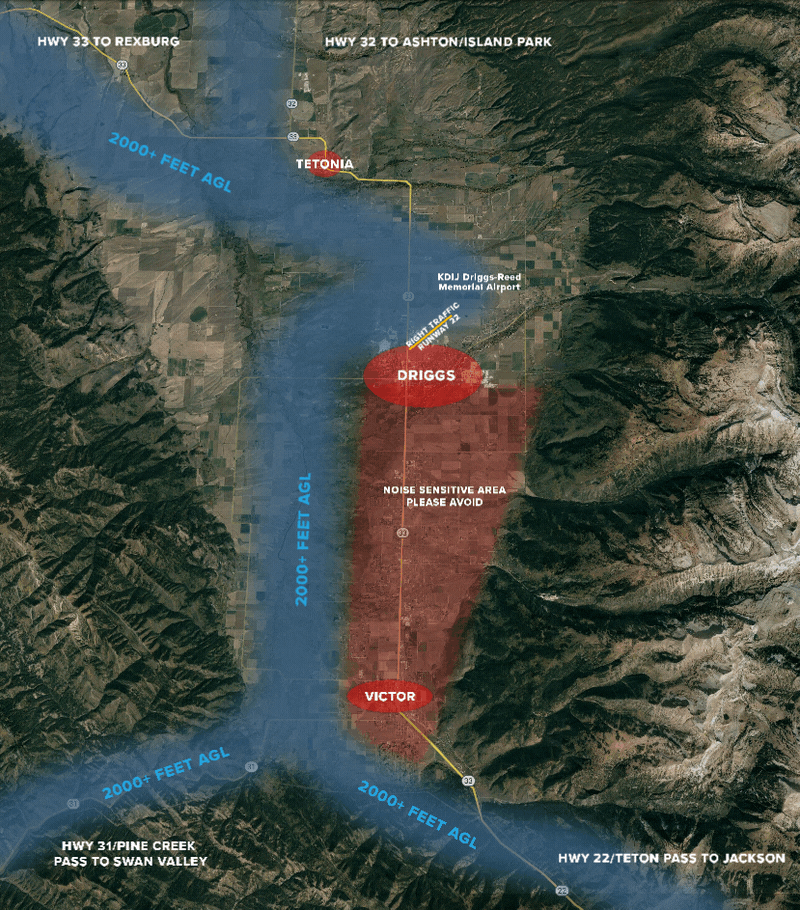
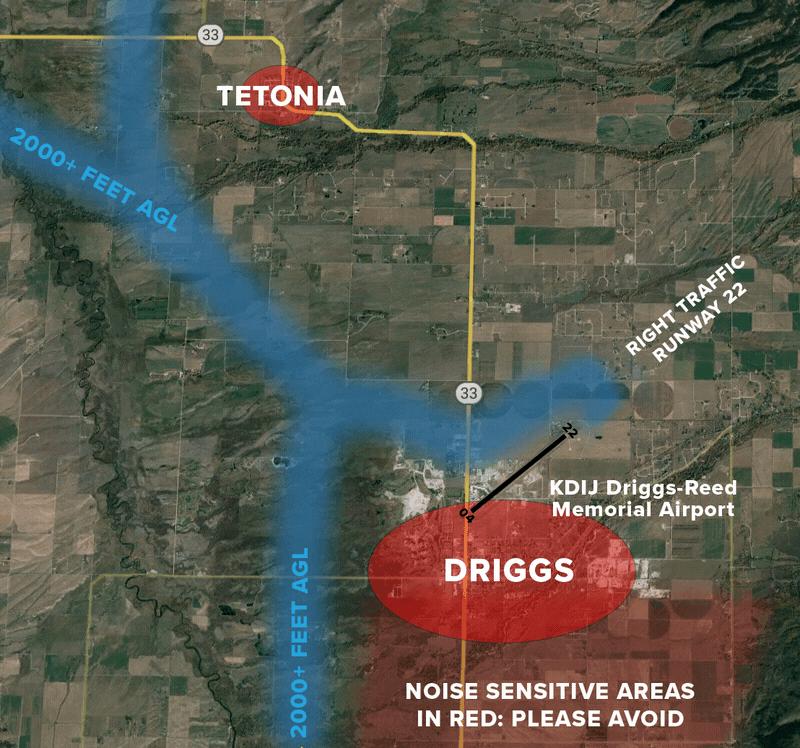
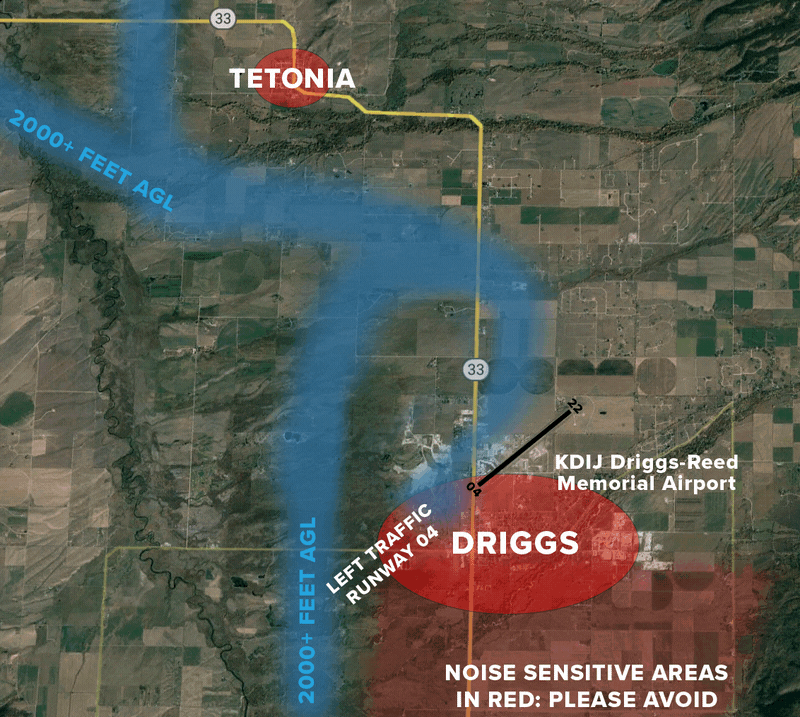
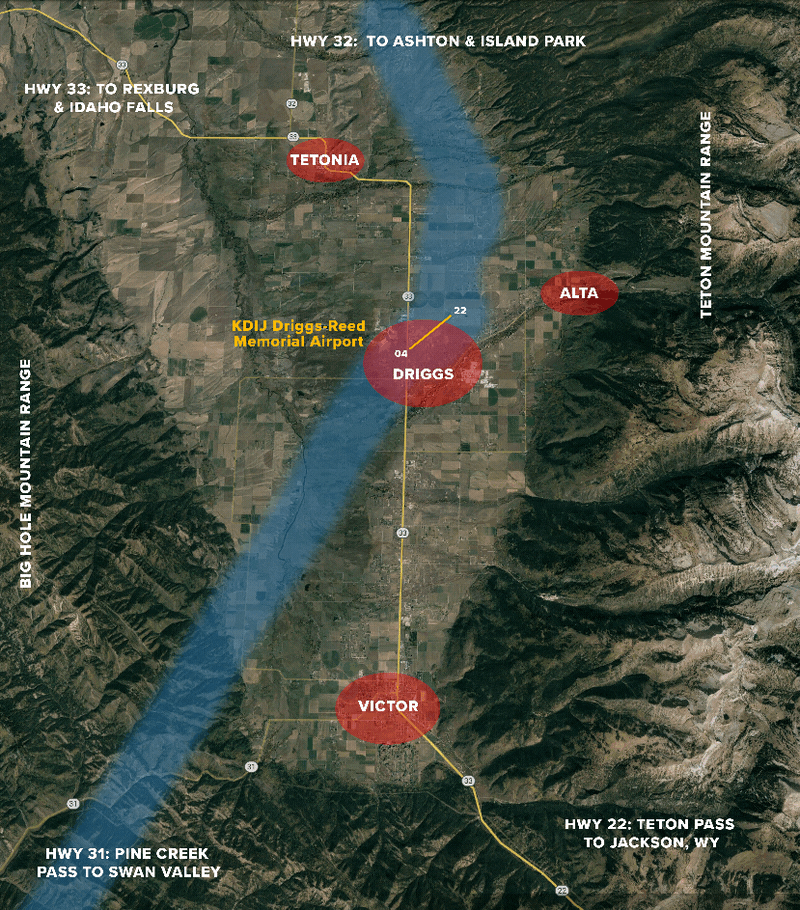
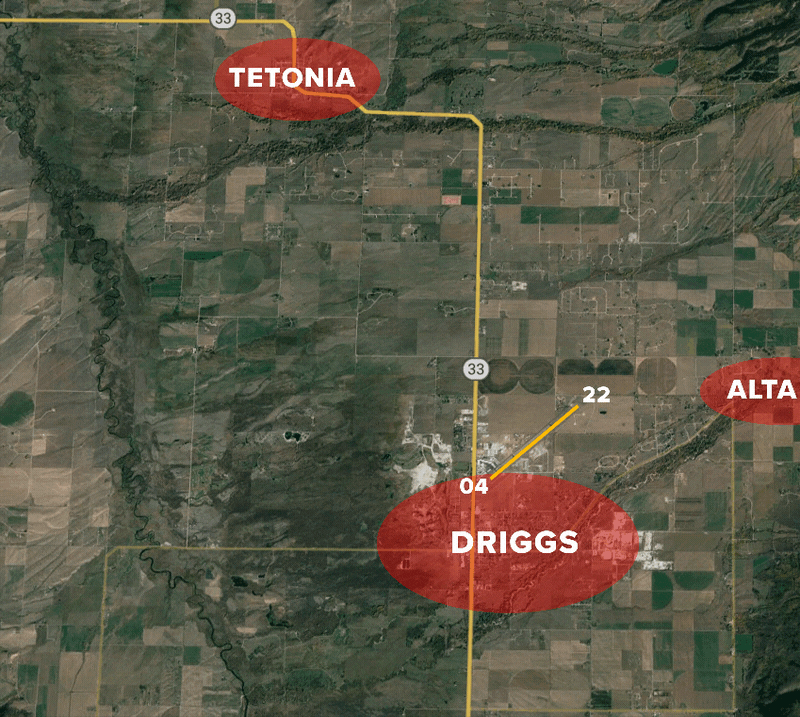
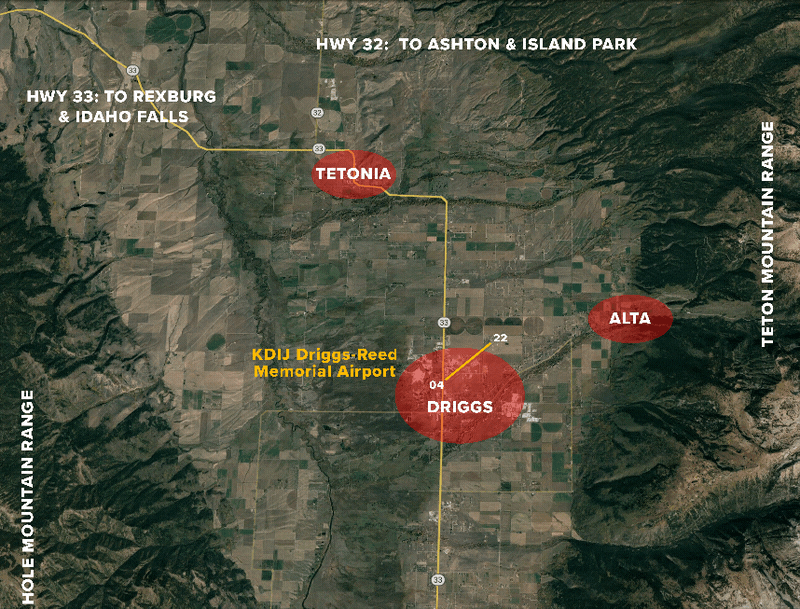
Pilots: Thank you for working with us by adhering to the following procedures:
Voluntary Noise Abatement Procedures
- AVOID flight operations between 2200 and 0700 local.
- Please observe this curfew unless an emergency exists.
- Aircraft with a Gross Takeoff Operating Weight in excess of 12,500 pounds should not be operated before 7:00 AM.
- Right Traffic Pattern Runway 22
- Traffic Pattern Altitude: 1000 AGL
- Use best angle (Vx) for first 500 feet . . . then best rate (Vy) to achieve maximum altitude.
- Intersection departures are discouraged.
- Avoid shallow climbs and gain as much altitude as safely possible before leaving the airport environment.
- Avoid flight over residential areas. Arrivals and departures over highways are preferred.
- Pattern altitude: 7,231 light aircraft. 7,731 heavy aircraft.
Curfew: There is a voluntary curfew on arrivals and departures between 10:00 p.m. and 7:00 a.m. As part of our "Good Neighbor" policy, we ask that you respect this curfew. We limit hours of service and fuel to discourage night operations. The City of Driggs has adopted voluntary noise abatement procedures for the Driggs-Reed Memorial Airport. Pilots arriving and departing from the airport are requested to use every means at their disposal to reduce the impact of noise on the Teton Valley Community.
DOWNLOAD NOISE ABATEMENT PROCEDURES PDF
KDIJ Rules and Regulations
FAA Noise Complaint Information for Community Airports
VFR / Visual Flight Rules: ARRIVALS
Southwest over Pine Creek Pass, remain west of Highway 33, overflying the Teton River to avoid flying over residential zones from Victor to Driggs. Remain at or above 2000 feet AGL as long as practical before descending to pattern altitude.
Southeast over Teton Pass, follow Highway 33. Remain south of the town of Victor, fly northbound, west of Highway 33, over the Teton River to avoid flying over residential zones from Victor to Driggs. Remain at or above 2000 feet AGL as long as practical before descending to pattern altitude.
Northwest, West of Tetonia, proceed directly to the airport at 45°. Remain at or above 2000 feet AGL as long as practical before descending to pattern altitude.
North over Felt, remain west of Highway 32 and the town of Tetonia, then proceed directly to the airport at 45°. Remain at or above 2000 feet AGL as long as practical before descending to pattern altitude.
VFR / Visual Flight Rules: DEPARTURES
- Avoid unnecessary and lengthy ground run-ups, particularly for runway 4 departures.
- Avoid departing over the city of Driggs. Avoid flying over neighborhoods and subdivisions to the east of Driggs.
- Runway 22: Turn right to a heading of 240° as soon as practical to avoid homes in Huntsman Springs subdivision. Continue climbing until above 2000 feet AGL, if possible.
- Runway 4: Turn left to a heading of 360°. Avoid flying over subdivisions east of Driggs.
Flight School Operations:
When practicing maneuvers, avoid flights over populated areas and developments (Driggs, Victor, Tetonia, Alta). When conditions and traffic permit, the requested practice area is north of Highway 33 and west of Highway 32.
General Noise Considerations:
When operating aircraft in Teton Valley, avoid flying over the city of Driggs, all neighborhoods east of Driggs, and the towns of Tetonia and Victor. Always fly at or above 2000 feet AGL in the valley until the descent to pattern altitude or landing configuration is required.
Note: The procedures described above are intended to be voluntary noise abatement procedures and are subject to pilot discretion for safety reasons.
IFR / Instrument Flight Rules: APPROACH PROCEDURES & TRAINING
Pilots are required to fly these procedures in poor weather and practice them in any weather per FAA regulations. Pilots typically train monthly to comply with FAA Instrument Flight Rules and flight currency requirements.
- Instrument Approaches from the North and Southwest are offset from the runway heading to avoid mountainous terrain in close proximity to the airport which allows pilots to descend below the clouds before reaching the airport.
- Pilots are instructed to the Initial Fix and then cleared for the approach which allows them to fly the procedure and land, or in the case of a practice or actual missed approach due to weather conditions they then fly the missed approach procedure to safely avoid terrain.
- Landing can be achieved on either runway 22 or 04, depending on the weather and wind.
- *LAMON is a departure and a missed approach waypoint designed to keep instrument aircraft safely clear of terrain.
IFR Animations of Arrival (valley view & close up) illustrate the flight patterns:
- From North landing on 22
- From North landing on 4
- From North missed approach and returning to LAMON*
- From South landing on 04
- From South circling left to land on 22
- From South missed approach and returning to LAMON*
IFR Animation of Departure illustrates the flight patterns:
- Departing from runway 22 to LAMON*
- Departing from runway 04 to LAMON*